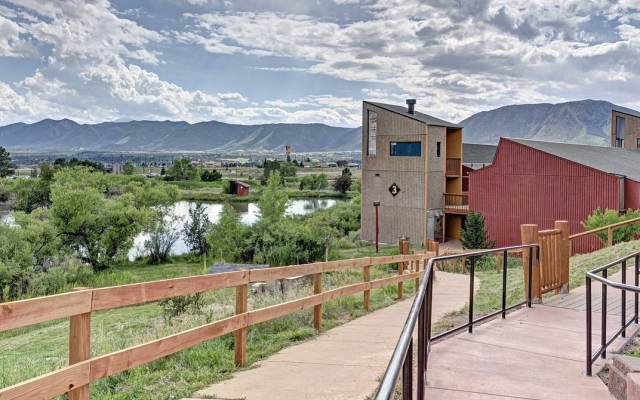Learn More
Skyland Trail
Claimed
Claimed
Claimed
Atlanta, Georgia, United States
2 to 6 months
Provider's Policy
Covered plans and verification of benefits.
$33,000 per month
Skyland Trail offers various levels of psychiatric care services, including a residential campus for young adults (ages 18-24) and another for adults.
Similar Centers to Consider
About Skyland Trail
Skyland Trail is located in Atlanta, Georgia and is a nationally recognized nonprofit mental health treatment organization. They work with adolescents ages 14-17 and adults ages 18 and older. Skyland Trail treats each client as an individual and creates tailored treatment plans that mix evidence based and holistic treatment models. In a classroom setting, they educate their clients about their mental illness and teach strategies that can be used to prevent relapse and cope with stress. Since 1989, Skyland Trail has been awarded $14 million in financial aid scholarships and 5 capital campaigns have helped raise more than $62 million for the campus and program expansion. Skyland Trail has a residential program, a day treatment program, an outpatient program, and a family involvement program. Skyland Trail is accredited by the Joint Commission. The base program cost of a 30-day stay in residential care is $33,000 for adults.
At Skyland Trail, clients enjoy private rooms and bathrooms. Clients ages 14-17 who decide to do a residential program typically stay for 6-12 weeks, and adults 18 and older who decide to do residential typically stay 8-12 weeks before stepping down to day treatments. Licensed nurses and residential staff are on site 24 hours a day.
Read More
Insurance Accepted
Provider's Policy:Skyland Trail is in-network with many major insurance plans.
Nearby Centers to Consider
Luxury rehab centers offer a unique blend of luxurious amenities and high-quality treatment. From private suites to gourmet dining, personal trainers to spa treatments, these facilities provide a high level of comfort and discretion.


Center Overview
Founded
1989
Languages
English
Accreditation
Joint Commission
Who We Treat
Men
Women
Young Adults
Emerging adults ages 18-25 receive treatment catered to the unique challenges of early adulthood, like college, risky behaviors, and vocational struggles.
Address
Atlanta, GA, USA

Levels of Care
 Residential
Residential Sober Living
Sober Living Day Treatment
Day Treatment Intensive Outpatient Program
Intensive Outpatient Program Outpatient
Outpatient Virtual & In-Home Care
Virtual & In-Home Care Licensed Primary Mental Health
Licensed Primary Mental HealthTreatment
Specializations
Bipolar
This mental health condition is characterized by extreme mood swings between depression, mania, and remission.
Learn More
Co-Occurring Disorders
A person with multiple mental health diagnoses, such as addiction and depression, has co-occurring disorders also called dual diagnosis.
Learn More
Depression
Symptoms of depression may include fatigue, a sense of numbness, and loss of interest in activities. This condition can range from mild to severe.
Learn More
Young Adults
Emerging adults ages 18-25 receive treatment catered to the unique challenges of early adulthood, like college, risky behaviors, and vocational struggles.
Learn More
Philosophy
Evidence-Based
A combination of scientifically rooted therapies and treatments make up evidence-based care, defined by their measured and proven results.
Learn More
Individual Treatment
Individual care meets the needs of each patient, using personalized treatment to provide them the most relevant care and greatest chance of success.
Learn More
Holistic
A non-medicinal, wellness-focused approach that aims to align the mind, body, and spirit for deep and lasting healing.
Learn More
Therapies
1-on-1 Counseling
Patient and therapist meet 1-on-1 to work through difficult emotions and behavioral challenges in a personal, private setting.
Learn More
Meditation & Mindfulness
A practiced state of mind that brings patients to the present. It allows them to become fully aware of themselves, their feelings, and the present moment.
Learn More
Adventure Therapy
This experiential approach uses the physical and emotional challenges of outdoor activities as tools for personal growth.
Learn More
Art Therapy
Visual art invites patients to examine the emotions within their work, focusing on the process of creativity and its gentle therapeutic power.
Learn More
Family Therapy
Family therapy addresses group dynamics within a family system, with a focus on improving communication and interrupting unhealthy relationship patterns.
Learn More
Horticultural Therapy
Gardening can be both meditative and inspiring. This therapy encourages social, emotional, and physical recovery.
Music Therapy
Singing, performing, and even listening to music can be therapeutic. Music therapy sessions are facilitated by certified counselors.
Learn More
Psychoeducation
This method combines treatment with education, teaching patients about different paths toward recovery. This empowers them to make more effective decisions.
Recreation Therapy
In recreation therapy, recovery can be joyful. Patients practice social skills and work through emotional triggers by engaging in fun activities.
Learn More
Spiritual Care
Tending to spiritual health helps treatment become more effective, allowing patients to better cope with their emotions and rebuild their spiritual wellbeing.
Learn More
Yoga
Yoga is both a physical and spiritual practice. It includes a flow of movement, breathing techniques, and meditation.
Learn More
What We Treat
Eating Disorders
An eating disorder is a long-term pattern of unhealthy behavior relating to food. Most people with eating disorders have a distorted self-image.
Learn More
Co-Occurring Disorders
A person with multiple mental health diagnoses, such as addiction and depression, has co-occurring disorders also called dual diagnosis.
Learn More
Self-Harm
The act of intentionally harming oneself, also called self-injury, is associated with mental health issues like depression.
Learn More
Bipolar
This mental health condition is characterized by extreme mood swings between depression, mania, and remission.
Learn More
Personality Disorders
Personality disorders destabilize the way a person thinks, feels, and behaves. If untreated, they can undermine relationships and lead to severe distress.
Depression
Symptoms of depression may include fatigue, a sense of numbness, and loss of interest in activities. This condition can range from mild to severe.
Learn More
Smoking Cessation
Quitting smoking—i.e., ceasing to smoke—means giving up smoking nicotine and tobacco products. This process has very important health benefits.
Anxiety
Anxiety is a common mental health condition that can include excessive worry, panic attacks, physical tension, and increased blood pressure.
Learn More
Trauma
Some traumatic events are so disturbing that they cause long-term mental health problems. Those ongoing issues can also be referred to as "trauma."
Learn More
Aftercare
Experience
Personal Amenities
Amenities
Special Considerations
Young Adults Program
Programs for young adults bring teens 18+ together to discuss age-specific challenges, vocational and educational progress, and successes in treatment.
Learn More
Activities
Off-Site Activities
We love hearing about your treatment experience
Help individuals and families seeking treatment by sharing your first-hand experience with this treatment provider. Review Guidelines.
Featured Rehabs
Ad Disclosure
Learn More





































